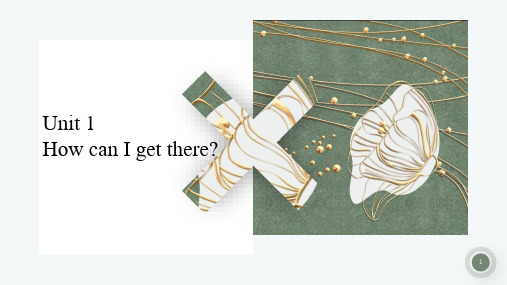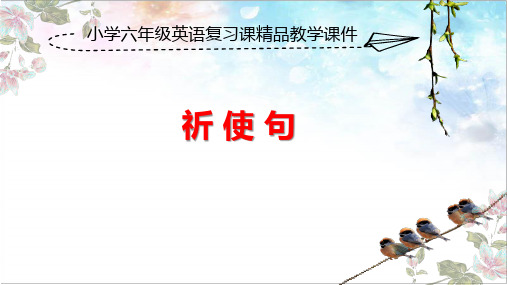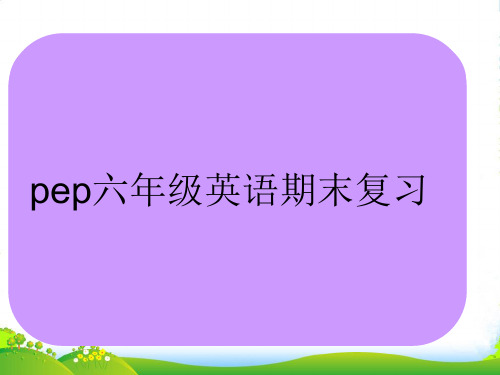《六年级英语复习课件》
合集下载
小学英语六年级总复习课件

• 11、What’t in your box? 你的盒子里是什么? ——用于询问
盒子里有什么物品
别人的名字
Unit 4 Do you like peaches? 你喜欢桃吗? Yes, I do./ No, I don’t. 是的,我喜欢。/ 不,我不喜欢。 What about pears? 梨怎么样? I like them very much. 我非常喜欢它们。 3、 Let’s have some peaches and pears. 让我们买一些桃和梨吧。 4、 It tastes good. 它尝起来很好吃。 5、 Draw a peach. Colour it pink. 画一个桃子。把它涂成粉红色。 6、 Let me share with you. 让我和你一同分享吧! 7、 Sorry , I don’t like bananas. 对不起,我不喜欢香蕉。 8、 A: Can I have an apple,please? 请问我能吃一个苹果吗? Can I have a watermelon,please? 请问我能吃一个西瓜吗? Can I have some orange juice,,please? 请问我能喝一些橙汁吗? B: Certainly./ Sure. Here you are. 当然可以。/当然可以。给你。 9、 Have some more ? No , thank you. 再吃一些吧? 不,谢谢。 10、It’s cheap! 它很便宜! 11、I want some apples,bananas and oranges.我想要一些苹果、香蕉和橙子 12、I’m hungry./ I’m full. 我饿了。/ 我饱了。 13、Dog bag, please. No way! 请给我打包。 绝不可以。
人教PEP版英语六年级上册Unit 1 - Unit 3 复习课件

I go to park by bike. 我骑自行车去公园 2. take +a/an+交通工具+to+地点 表示”乘坐......去.....“ I take a bike to the park. 我骑自行车去公园
3.特殊: go to+地点+ on foot walk to +地点
I go to school on foot. = I walk to school.
提出建议的句型: Let's +动词原形+其他
Let's go to the nature park. 我们去自然公园吧。 我们去学校吧。 Let's go to school.
Let's=Let us 的缩写 Let 让 us 我们 we的宾格形式
情态 1. 情态动词+动词原形 动词
2.情态动词没有人称和数的变化
11
on foot 步行
by bus 乘公交汽车
by ship 乘轮船
by taxi 乘出租车
by plane 乘飞机
by train 乘火车
by subway 乘地铁
1、
1.问句: How do you come to/go to+地点名词? 询问对方来某地的交通方式
答语: I come to/go to +地点+表达出行方式的介词短语
a e i o u 元音字母开头且发元音的单词 冠词要用an
have a good time!玩的开心!
have to do(动词原形) 不得不去做
他不得不去学校。
he has to go to school.
3.特殊: go to+地点+ on foot walk to +地点
I go to school on foot. = I walk to school.
提出建议的句型: Let's +动词原形+其他
Let's go to the nature park. 我们去自然公园吧。 我们去学校吧。 Let's go to school.
Let's=Let us 的缩写 Let 让 us 我们 we的宾格形式
情态 1. 情态动词+动词原形 动词
2.情态动词没有人称和数的变化
11
on foot 步行
by bus 乘公交汽车
by ship 乘轮船
by taxi 乘出租车
by plane 乘飞机
by train 乘火车
by subway 乘地铁
1、
1.问句: How do you come to/go to+地点名词? 询问对方来某地的交通方式
答语: I come to/go to +地点+表达出行方式的介词短语
a e i o u 元音字母开头且发元音的单词 冠词要用an
have a good time!玩的开心!
have to do(动词原形) 不得不去做
他不得不去学校。
he has to go to school.
小学六年级英语复习课《祈使句》精品教学课件

口诀: 使用祈使句,表示请求、命令或建议。 动词原形做开头,主语是you要省去。 句首Don't加动原,表示否定要注意。 Let's not加原形,也是一种否定句。 单词please表客气,句首句末没关系。
课堂练习:单项选择。
—____A____ help you.
—Thank you!
A.Let me
二、根据情景,选择正确的答案。
( )1.这里禁止吸烟,你应这样提醒大家:________
A.No parking!
B.No smoking!
C.No car!
( )2.在英语课上,老师对你说:________
A.Shout loudly, please. B.Read after me, please. C.Clean the room, please.
C.Go; turning
( )10.It's cold.________ the window, please.
A.Don't open
B.Don't cl要求完成下列句子。 1.You should keep the classroom clean.(改为祈使句) ________________________________________________________________________ 2.You can sit on the yellow chair.(改为祈使句) ________________________________________________________________________ 3.You must do your homework carefully.(改为祈使句) ________________________________________________________________________ 4.Take off your coat.(改为否定句) ________________________________________________________________________ 5.Water the flowers in the garden.(改为否定句) ________________________________________________________________________
小学六年级英语语法总复习PPT课件

.
• 小学阶段不规则动词全表
• Infinitive Past tense Infinitive
• 1. am, is
was
2. keep
• 3.are
were
5. make made
4.become
7. blow
blew
8. read
• 9. buy
bought
10. ride
• 11. catch caught
fly-flying walk-walking
jump-jumping sleep-sleeping
climb-climbing fight-fighting
swing-swinging drink-drinking catch-catching pick-picking
watch-watching play-playing
dance danced
变y为 i+ed
study studied
动词的过去式(不规则)
go-went read-read eat-ate sing-sang take-took buy-bought see-saw swim-swam am,is-was do-did are-were have-had get-got leave-left fly-flew stop-stopped(双写)
.
• 一般现在时的变化
1. be动词的变化。
否定句:主语+ be + not +其它。 如:He is not a worker.他不是工人 一般疑问句:Be +主语+其它。 如:-Are you a student? -Yes. I am. / No, I‘m not. 特殊疑问句:疑问词+一般疑问句。如:Where is my bike?
• 小学阶段不规则动词全表
• Infinitive Past tense Infinitive
• 1. am, is
was
2. keep
• 3.are
were
5. make made
4.become
7. blow
blew
8. read
• 9. buy
bought
10. ride
• 11. catch caught
fly-flying walk-walking
jump-jumping sleep-sleeping
climb-climbing fight-fighting
swing-swinging drink-drinking catch-catching pick-picking
watch-watching play-playing
dance danced
变y为 i+ed
study studied
动词的过去式(不规则)
go-went read-read eat-ate sing-sang take-took buy-bought see-saw swim-swam am,is-was do-did are-were have-had get-got leave-left fly-flew stop-stopped(双写)
.
• 一般现在时的变化
1. be动词的变化。
否定句:主语+ be + not +其它。 如:He is not a worker.他不是工人 一般疑问句:Be +主语+其它。 如:-Are you a student? -Yes. I am. / No, I‘m not. 特殊疑问句:疑问词+一般疑问句。如:Where is my bike?
小学六年级英语语法复习ppt课件

小学六年级英语
.
.
.
.
• 写出下列各词的复数 I _________him _________this ___________her ______ watch _______child _______photo ________diary ______
man______ woman_______ paper_______ juice___________ water________ milk________ rice__________ tea__________
.
• 2.行为动词:主语+行为动词(+其它)。如: We study English.我们学习英语。 当主语为第三人称单数(he, she,it)
时,要在动词后加"-s"或"-es"。如: Mary likes Chinese.玛丽喜欢汉语。
.
• 二、用括号内动词的适当形式填空。 1. He often ________(have) dinner at home. 2. Daniel and Tommy _______(be) in Class One. 3. We _______(not watch) TV on Monday. 4. Nick _______(not go) to the zoo on Sunday. 5. ______ they ________(like) the World Cup?
• 6, 用在序数词,方位词前和形容词最高级前, the first , the east, the tallest
.
• 3、零冠词(不用定冠词) (1)名词前已有作定语用的this, that, these, those, my, your, his, her, our, their, some等限 定词时,不用冠词。如:this eraser, her pencilbox, some boxes, those women等。 (2)泛指的不可数名词前一般不用冠词。如:meat, rice, water, bread, tea, milk, juice等。 (3)复数名词表示泛指时,不用冠词。如: the people in the room are doctors. 房间里的那 些人是医生。 (4)在表示学科的名词前一般不用冠词。如: Chinese, English, math, physics, history等。在 三餐饭和球类运动名词前一般不加冠词。如:have breakfast/ lunch/ supper, play basketball/ football等。 (5)在季节、节日、星期、月份前不用冠词。如: autumn, summer, winter, spring, Teachers’ day, Children’s day, Sunday, February等。 (6)在表颜色、语种和国家名词前不用冠词。如: white, brown, French, Australia等。 (7)在表示称呼语的名词之前,以及职务、头衔的 名词前不用冠词。如:Docto.r green is a scientist. 格林博士是位科学家。
.
.
.
.
• 写出下列各词的复数 I _________him _________this ___________her ______ watch _______child _______photo ________diary ______
man______ woman_______ paper_______ juice___________ water________ milk________ rice__________ tea__________
.
• 2.行为动词:主语+行为动词(+其它)。如: We study English.我们学习英语。 当主语为第三人称单数(he, she,it)
时,要在动词后加"-s"或"-es"。如: Mary likes Chinese.玛丽喜欢汉语。
.
• 二、用括号内动词的适当形式填空。 1. He often ________(have) dinner at home. 2. Daniel and Tommy _______(be) in Class One. 3. We _______(not watch) TV on Monday. 4. Nick _______(not go) to the zoo on Sunday. 5. ______ they ________(like) the World Cup?
• 6, 用在序数词,方位词前和形容词最高级前, the first , the east, the tallest
.
• 3、零冠词(不用定冠词) (1)名词前已有作定语用的this, that, these, those, my, your, his, her, our, their, some等限 定词时,不用冠词。如:this eraser, her pencilbox, some boxes, those women等。 (2)泛指的不可数名词前一般不用冠词。如:meat, rice, water, bread, tea, milk, juice等。 (3)复数名词表示泛指时,不用冠词。如: the people in the room are doctors. 房间里的那 些人是医生。 (4)在表示学科的名词前一般不用冠词。如: Chinese, English, math, physics, history等。在 三餐饭和球类运动名词前一般不加冠词。如:have breakfast/ lunch/ supper, play basketball/ football等。 (5)在季节、节日、星期、月份前不用冠词。如: autumn, summer, winter, spring, Teachers’ day, Children’s day, Sunday, February等。 (6)在表颜色、语种和国家名词前不用冠词。如: white, brown, French, Australia等。 (7)在表示称呼语的名词之前,以及职务、头衔的 名词前不用冠词。如:Docto.r green is a scientist. 格林博士是位科学家。
外研版(三起)英语六年级上册复习课ppt课件

(C)2. ______ there two doors in our classroom ?
A. Am B.Is C.Are
(C)3. There _________ some postcards on the desk
. A. am B.is C.are
( B) 4 . There _ _ _ _ _ _ _ not any milk in my bag .
7.Amy like watching TV. reading
go
likes
Reading and judging “True” or “False”:
I’m Helen. I’m from Changji, Xinjiang, China.
I’m an English
teacher in a primary1.schoo4l.. I like pop songs , reading , swimming , playing
A:What do you do B:We …
in Spring Festival on Lantern Festiva?l on Dragon Boat Festival
on Mid-Autumn Festival
D( )1.Tom
( )2.Daming
B( )3.Amy
A( )4.Sam
( )5.Lingling
A. a
B.some C. any
( B) 3 . There are _ _ _ _ postcards on the desk.
A. a
B. some C. any
( A) 4 . There is _ _ rice in the bag , but there aren’ t _ _ _
A. Am B.Is C.Are
(C)3. There _________ some postcards on the desk
. A. am B.is C.are
( B) 4 . There _ _ _ _ _ _ _ not any milk in my bag .
7.Amy like watching TV. reading
go
likes
Reading and judging “True” or “False”:
I’m Helen. I’m from Changji, Xinjiang, China.
I’m an English
teacher in a primary1.schoo4l.. I like pop songs , reading , swimming , playing
A:What do you do B:We …
in Spring Festival on Lantern Festiva?l on Dragon Boat Festival
on Mid-Autumn Festival
D( )1.Tom
( )2.Daming
B( )3.Amy
A( )4.Sam
( )5.Lingling
A. a
B.some C. any
( B) 3 . There are _ _ _ _ postcards on the desk.
A. a
B. some C. any
( A) 4 . There is _ _ rice in the bag , but there aren’ t _ _ _
人教版(PEP)六年级英语上册期末总复习课件

-----I’m going to be a science teacher one day. 我想将来有一天 当科学老师
1、What are you going to do?你想做什么?询问他人在未来的 打算。be going to 后面要跟动词的原形。注意be going to be 意思是 “打算成为什么,干什么职业。” 注意一下句子的区别,找出正确回答。 What are you going to do this afternoon? I am going to 加 做事的词组
pep六年级英语期末复习
重点词汇 science museum post office bookstore cinema hospital crossing turn left go straight turn right 重点句型 Where is the museum shop?
It’s near the door.
3 We’re going to draw some pictures in Renmin Park. 我们要到人民公园去画画。 4、 I’m going to see a film. 我打算去看电影。
5、 I’m going to visit my grandparents. 我打算去看望外 祖父母。
How are you going?I am going to 加交通方式的词组
Who are you going with? I am going to 加某人
部分疑问代词的意义与用法:
(1)What 什么。用来问是什么,做什么,叫什么,什么样等 等。如:What is your name? 你的名字叫什么? What is your father? 你爸爸是干什么的? What is your hobby?你的爱好是什么?What is your favourite food?你最喜爱的食物是什么? What’s your math teacher like? 你的数学老师长得什么样子? (2)Where , 在哪里,到哪里。用来问地点。
1、What are you going to do?你想做什么?询问他人在未来的 打算。be going to 后面要跟动词的原形。注意be going to be 意思是 “打算成为什么,干什么职业。” 注意一下句子的区别,找出正确回答。 What are you going to do this afternoon? I am going to 加 做事的词组
pep六年级英语期末复习
重点词汇 science museum post office bookstore cinema hospital crossing turn left go straight turn right 重点句型 Where is the museum shop?
It’s near the door.
3 We’re going to draw some pictures in Renmin Park. 我们要到人民公园去画画。 4、 I’m going to see a film. 我打算去看电影。
5、 I’m going to visit my grandparents. 我打算去看望外 祖父母。
How are you going?I am going to 加交通方式的词组
Who are you going with? I am going to 加某人
部分疑问代词的意义与用法:
(1)What 什么。用来问是什么,做什么,叫什么,什么样等 等。如:What is your name? 你的名字叫什么? What is your father? 你爸爸是干什么的? What is your hobby?你的爱好是什么?What is your favourite food?你最喜爱的食物是什么? What’s your math teacher like? 你的数学老师长得什么样子? (2)Where , 在哪里,到哪里。用来问地点。
PEP人教版小学英语六年级下册期末单元复习课件(全册)

注: 没有小尾巴
形代其后必须跟名词, 不能单独使用
1.相同点: 都表示XX的,有指代作用。
2.不同点: 用法不同
3.关联点: 名代=形代+物体
名代可以单独使用, 后面不接名词。
Your fish are bigger than mine.
Your fish are bigger .
Read and write 重点句子: 1.Wu Yifan and his family are going on a trip to the countryside. 2.Litter Duck is watching the sun go down. 3.It is getting lower and lower.
What size are your shoes?
什么码
1.I wear size +数字 shoes. 2.My shoes are size +数字.
省略形式: Size+数字
6.Your feet are bigger than mine.
foot-----feet(脚)
复数
mine=my feet
thinner
Tip:只有形容词才有比较级哦!
形容词
比较级
共同点: 都是形容词;词尾都有er。
younger
older
形容词比较级
注意: 至少有两者才能构成比较。 只有形容词才有比较级。
Sarah is younger.
参与比较的是Sarah 和Miss White.
完整形式 Sarah is younger than Miss White
Sarah is younger.
